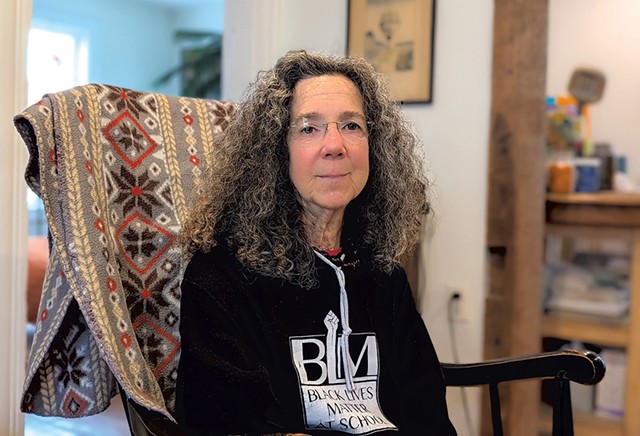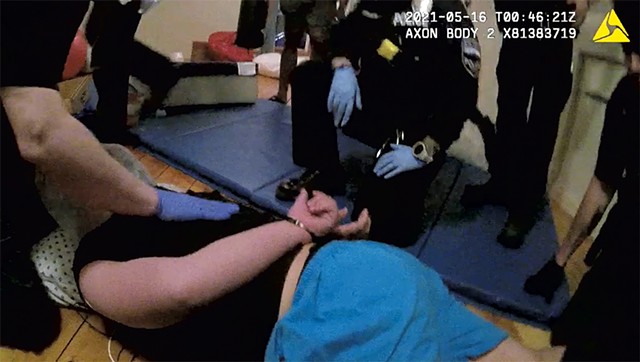
- Courtney Lamdin ©️ Seven Days
- Cathy Austrian
The mother of a Black teenager with intellectual disabilities is suing the City of Burlington, alleging that police officers used excessive force when they pinned him to his bed to retrieve a stolen e-cigarette in 2021.
Filed on Tuesday in Vermont Superior Court, the suit says officers "needlessly escalated" the situation, and then city EMTs forcibly sedated the 14-year-old boy with ketamine. The sedative gained notoriety in 2019 after it was administered to a young Black man in Colorado who later died.
The Burlington incident grabbed national attention in early 2022 amid a debate over police officers' use of force. Cathy Austrian, the boy's mother, alleges that the officers' and paramedics' actions were racially motivated. She says her son's experience underscores the need for stronger police oversight in Burlington — an issue on which city leaders have repeatedly failed to find consensus.
"I'm committed to this because of my family," she told Seven Days. "What happened was wrong, and I'll do whatever I can to see that there can be change, justice and healing."
Austrian is being represented by the American Civil Liberties Union of Vermont and the New York City offices of Latham & Watkins, an international law firm. The MacArthur Justice Center, which litigates police misconduct lawsuits, is consulting on the case.
Beyond punitive damages, the lawsuit also demands better anti-bias training for police and a policy that would ban city paramedics from using ketamine on people in mental distress. Reached on Tuesday evening, Samantha Sheehan, spokesperson for Mayor Miro Weinberger, declined to comment because city attorneys had not yet reviewed the case.
Seven Days interviewed Austrian and reviewed the lawsuit, police reports and more than an hour of police body camera footage to report this story.
Austrian began fostering her son in 2005, when he was just 5 months old. She later adopted him. His birth mother is developmentally delayed, according to the lawsuit, and his own cognitive challenges manifested early in life. In the eighth grade — when the police encounter occurred — he was performing at a fourth-grade level. He's been diagnosed with ADHD and "complex trauma," the lawsuit says.
Austrian said the police department knew about her son's background when it sent two officers to her Old North End home one evening in May 2021. The teen, who is not named in the suit, had come home with several vape pens he'd stolen from a nearby convenience store. Wanting to teach her son a lesson, Austrian called the police. So did the store clerk, who told officers the boy had been carrying a hammer.
Police had been to the Austrian home before and resolved conflicts peaceably. That May evening, Austrian told Officers Kelsey Johnson and Sergio Caldieri that her son recently had an MRI on his heart and had just increased his ADHD medication. She said he'd been acting as if he weren't "based in reality."
Austrian had retrieved all but one vape pen, which the teen was clutching in his hands. Officers asked him repeatedly to turn it over and said he'd be arrested if he didn't comply, but he ignored them and sat silently on the bed. After about 10 minutes, the officers strapped on black gloves and walked toward the teen, body camera footage shows.
"I'm not playing this game anymore," Officer Johnson said.
A short time later, officers pushed the boy against the bed, grabbed the vape pen and stepped back, but he lashed out, flailing his arms, the suit says. Officer Caldieri, in a use-of-force report submitted afterward, said the teen punched him.
The officers handcuffed the boy, pinning him to the floor on his stomach. He continued to struggle.
"Instead of ... decelerating and disengaging from the encounter, the two officers again responded with disproportionate force, treating the 14-year-old as if he were an imminent and serious danger to their person," the filing says.
The boy screamed and swore, almost hyperventilating. Fearing that her son might have a heart attack, Austrian asked a police sergeant who by then had arrived at her home to call Burlington Fire Department EMTs.
"He can't stand to be restrained," Austrian told the sergeant. "It's not fair to him; he's 14. He needs some medical help. Please."

- Screenshot
- Authorities detaining the teen
Paramedics arrived and placed a mesh "spit hood" over the teen's head, causing him to thrash wildly. After consulting with a doctor, they injected the boy with ketamine — a sedative used to calm agitated patients — and took him to the hospital. According to the suit, paramedics only told Austrian they'd give the boy "something to help him calm down" but didn't specify ketamine.
The teen was discharged the next day, "bruised, disoriented and traumatized by his experience," the lawsuit says.
Austrian later learned that the EMTs had diagnosed her son with "excited delirium," a controversial syndrome characterized by aggressive behavior — and one that's been denounced by medical experts, including the American Psychiatric Association. The syndrome, which is disproportionately applied to Black people, has been attributed to people who died or were injured in police custody. George Floyd was diagnosed with excited delirium. So was Elijah McClain, the Aurora, Colo., man who died after police forcibly restrained him and EMTs administered ketamine in 2019. Two paramedics and a police officer were convicted of criminally negligent homicide in McClain's death. First responders in Aurora can no longer administer ketamine.
Before the incident involving Austrian's son, the Burlington Fire Department regularly recorded the age, but not the race, of people to whom its EMTs administered ketamine. Of 86 people dosed between 2016 and 2021, Austrian's son was the youngest. After police commissioners questioned the use of the drug in the Austrian case, the department said it would track the racial identity of those it treated. But updated data provided to Seven Days on Tuesday did not include patients' race. In an email, Fire Chief Mike LaChance said he'd look into it.
Austrian's lawsuit claims that paramedics broke state medical protocol by giving her son the drug. The 2020 Vermont Statewide Emergency Medical Services Protocols, reviewed by Seven Days, do not include guidelines for using the drug to restrain a minor.
The lawsuit also alleges that first responders were ill prepared to help people with mental health challenges — and says police violated their own policies by failing to de-escalate the situation. Department directives on interacting with people with disabilities and "diminished capacities" instruct officers to give subjects physical space and to not "[rush] their response," the suit says.
The filing says police showed racial bias in dealing with the teen. Black boys are "misperceived as older, angrier and more threatening than their behavior warrants," the lawsuit says. "Officers thus reacted to a child's distress as if it were an adult's rage."
The suit refers to previous allegations that Burlington police have used excessive force against Black people and those in mental health crisis. In 2013, police fatally shot Wayne Brunette, a mentally ill man who was brandishing a shovel. His parents, who had called police to help calm the situation, later received a settlement in a wrongful death suit. In 2016, police shot and killed Ralph "Phil" Grenon, a 76-year-old a man with schizophrenia, after an hours-long standoff, because he charged at officers with a knife. A state panel that reviewed the case concluded that officers didn't consider how Grenon's mental state affected his ability to comply with commands.
More recently, in spring 2019, the public learned that police had knocked two Black men unconscious during arrests the previous fall. Both of those men sued the department for excessive force, and last year the city paid $750,000 to settle one of those lawsuits. One of the officers involved left the department after receiving a $300,000 buyout. The other case is still pending in federal court.
Hillary Rich, an attorney with the ACLU of Vermont, said officers "created a crisis" in the Austrian case.
"To use intense force against an unarmed, peacefully sitting child was just an egregious violation of his constitutional rights and his sense of safety and well-being," she said. "They [turned] a situation that could have and should have been resolved peacefully into a deeply traumatic event that has really betrayed this family."
Austrian said she's suing in part to push for better police oversight. About a week after the incident, she filed a complaint with the city's civilian Police Commission. Chief Jon Murad told her three weeks later that the officers used "appropriate" force and "did not violate any Department rules," the lawsuit says. Commissioners, however, kept investigating, even hiring a lawyer to review the case. But their recommendations for how to handle the complaint were kept confidential, even from Austrian.
The lack of transparency pushed Austrian last year to advocate for a ballot item that would have created an independent police oversight board with the ability to hire and fire officers, including the chief. The proposal was soundly defeated on Town Meeting Day in March 2023.
City councilors promised to come up with an alternative, forming a special committee that, earlier this month, proposed a model that would give the Police Commission more power. The council had pledged to put the proposal on the ballot this March but instead sent it to the Police Commission for more review. The council will discuss it again in June.
Austrian lamented that Burlington discussions about public safety have largely focused on rebuilding the diminished police force in the years since the council voted to reduce its size. She hopes that the lawsuit, and sharing her son's story, will revive what she says are needed conversations about police accountability.
"This should not have happened to my child. This should never happen to any other child," Austrian said. "I can't rest until I see this through."













Comments
Comments are closed.
From 2014-2020, Seven Days allowed readers to comment on all stories posted on our website. While we've appreciated the suggestions and insights, right now Seven Days is prioritizing our core mission — producing high-quality, responsible local journalism — over moderating online debates between readers.
To criticize, correct or praise our reporting, please send us a letter to the editor or send us a tip. We’ll check it out and report the results.
Online comments may return when we have better tech tools for managing them. Thanks for reading.